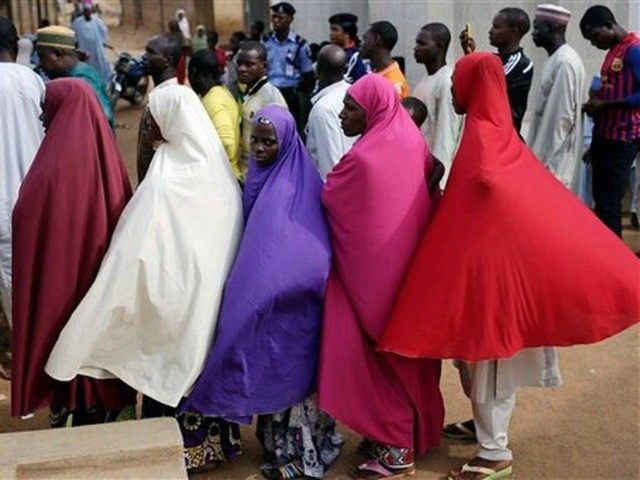As Nigerian voters turned out at the ballot box in droves on Saturday, the main things on their minds were ending corruption and putting a stop to crime and Islamic terrorism, according to a new poll by the Pew Research Center.
The most important finding of the survey was that “Nigerians detest Boko Haram,” with 82% of Nigerians expressing an unfavorable view of the radical jihadist group Boko Haram, and a full 79% holding a “very unfavorable” view. The Pew Center found that Nigerians’ antipathy toward the terrorist group is not based on confessional partisanship, but is shared by Christians and Muslims alike.
Effectively stopping Boko Haram is even more critical since the group formally pledged its allegiance to the Islamic State earlier this month.
A message allegedly from Boko Haram leader Abubakar Shekau said:
We announce our allegiance to the Caliph of the Muslims … and will hear and obey in times of difficulty and prosperity, in hardship and ease, and to endure being discriminated against, and not to dispute about rule with those in power, except in case of evident infidelity regarding that which there is a proof from Allah.
Nearly 60 million voters have registered for Nigeria’s first general election, where an opposition candidate has a realistic chance of defeating a sitting president. According to the Pew Center, a substantial majority of Nigerians say crime (88%) and corruption (86%) are “very big problems in their country.”
Among the 14 candidates running for Nigeria’s top office, the Christian President Goodluck Jonathan and Muslim former military dictator Muhammadu Buhari are front-runners. Though the country is roughly split 50-50 between Christians and Muslims, a growing popular concern to stand up to Islamic terrorists seems to be taking precedence over religious affiliation.
On Friday, the Nigerian army claimed it had destroyed Boko Haram’s headquarters in the northeastern town of Gwoza in a move with clear political overtones. Sitting President Goodluck Johnson, the incumbent in Saturday’s election, has been widely criticized for doing little to slow the relentless march of Boko Haram, and a military victory will be seen as evidence against his reputation of apathy.
Reports suggest, in fact, that Nigeria’s elections were postponed with the express intent of giving Johnson the chance to make a military statement against Boko Haram, thereby improving his chances of winning.
Boko Haram has held Gwoza since August of 2014 and had set up a Sharia-based rule in the town where the group was reportedly holding the 200 schoolgirls kidnapped from Chibok a year ago.
Ten days ago, Pope Francis blasted Boko Haram for its ongoing violence against Christians and Muslims in Nigeria, encouraging bishops and priests to form a united front in opposing the jihadists. In his letter to Nigeria’s Catholic bishops, Francis decried the “new and violent forms of extremism and fundamentalism” besetting the nation, referring to the jihadists as “people who claim to be religious, but who instead abuse religion, to make of it an ideology for their own distorted interests of exploitation and murder.”
Earlier this month, the British Foreign and Commonwealth Office reported that in 2014, Boko Haram had killed more than 4,000 people in Nigeria and kidnapped another 900, figures corroborated by Amnesty international.
Follow Thomas D. Williams on Twitter @tdwilliamsrome.

COMMENTS
Please let us know if you're having issues with commenting.